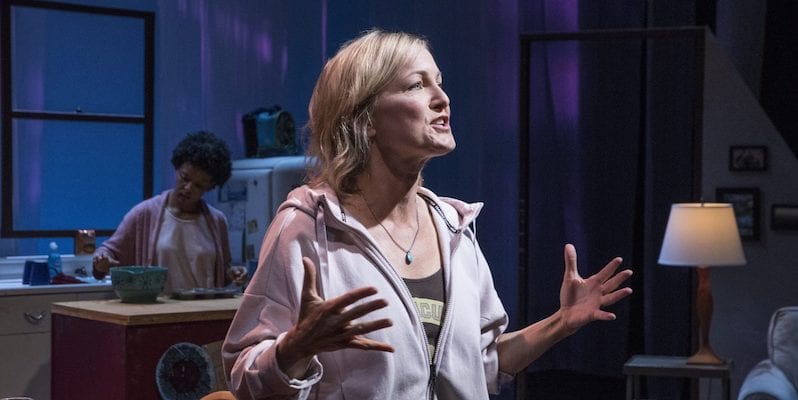
Cheryl Strayed’s advice column finds a voice onstage
By Lisa Kennedy for the Denver Post (Read the original.)
3 stars (out of 4)
It isn’t outlandish to imagine that there could be a play about Ann Landers or Abigail Van Buren. Or perhaps a show about the two of them; after all, they were identical twins who went on to become advice columnists.
It is harder to imagine their actual replies providing the lovely, aching, sturdy spine of a play. Yet that is exactly what occurs in the Boulder Ensemble Theatre Company’s production of “Tiny Beautiful Things,” about advice columnist Sugar and her avid letter-writers (at the Dairy Arts Center through Oct. 12).
“Dear Sugar” was an advice column begun in 2008 by Steve Almond (writing anonymously) at the online literary mag Rumpus. In 2010, a new voice took over duties as Sugar, and was a hit, plying what her predecessor — and the guy who suckered her into the gig — termed “radical empathy.”
Then, in 2012, the unknown writer of all those compassionate columns — full of tenderness and rife with wit — revealed herself to be Cheryl Strayed, perhaps best known for “Wild,” her dazzling, earthy memoir of a journey along the Pacific Crest Trail.
Nia Vardalos adapted “Tiny Beautiful Things: Advice on Love and Life from Dear Sugar,” the 2012 collection of letters and Sugar-infused genius, for the stage. The 80-minute dance of columnist and her letter-writers is filled with relatable beseeching and deft affirming. “Be prepared to cry,” was the headline of the New York Times review when the show, starring Vardalos, opened at the Public Theater in New York.
And there was audible sniffling opening night at the Dairy Arts Center’s Grace Gamm Theatre. Many of the topics the letter-writers seek clarity on are sure to strike nerves, to stir up old hurts and even grief. Broken marriages, a miscarriage, unmitigated existential frustration all get an airing. To each inquisitor — portrayed by three agile actors — Sugar has crafted an authentic reply. Part of the pleasure of “Tiny Beautiful Things” is the way it subtly charts Sugar’s embrace of her role as advice-giver.
A late scene finds Sugar and the letter-writers gathered around the kitchen island making sandwiches and packing lunch bags. What a fine visual metaphor for the intimacy and trust of the writer and her readers.
You know how well-intentioned friends can say to your confessed woes, “I know just what you mean,” and then launch into their own tales of misfortune? Well somehow, miraculously, Sugar pulls this off without ever sounding like a narcissist or lousy listener. She is quite the opposite.
Vardalos, who arrived on the scene in 2002 with the crowd-pleasing indie sleeper “My Big Fat Greek Wedding,” is no stranger to sentiment, and it’s easy to imagine her presenting a softer version of Strayed. In this production, Diana Dresser inhabits Sugar with a few more callouses but all the generosity of spirit intact. This Sugar cannot be accused of being saccharine.
Her compassion is grounded in a rough early life. In response to a terse, profanity-infused letter — signed “Best, WTF” — Sugar offers a lengthy response that, among other things, recounts the story of her being sexually abused as a child. It’s a truly ugly recollection that brings with it a stunning gift of a lesson.
“Tiny Beautiful Things” feels like it could have been of a one-woman show. Roaming her kitchen or curling up on the couch in front of her laptop or climbing the stairs to retrieve the laundry, Sugar securely holds our focus. But — to paraphrase Sandra Bernhard’s one-woman show from the late 1980s — without those letter-writers, Sugar would be nothing.
Josh Hartwell, Rodney Lizcano and Simone St. John portray and recite the words of a legion of letter-writers. Director Rebecca Remaly switches up gender and age. As Sugar shares the time she worked with struggling teen girls, Hartwell stretches across the top of a couch, his legs and feet in constant motion, much like a teen girl. Lizcano relishes his repeated appearance of the furious scribe of the WTF missives. St. John brings palpable anguish to Stuck’s plea.
Language remains the currency of this play and the poetry on which the compassion, heartache and, yes, humor flows — which elicits this less-is-more observation. Ace scenic designer Tina Anderson’s set offers a pitch-perfect representation of the home of a writer with children, a husband, a book awaiting completion, a life. The detailed interior impresses. Yet it feels more beautifully detailed than necessary. Along with the occasionally too-busy motion of the letter-writers, the set seems to (ever so slightly) betray a fear that, as wonderful as it is, “Tiny Beautiful Things” is not quite a “play.”
Regardless, it is most assuredly as generous an act of theater as any of Sugar’s full-of-grace (even when irreverent) replies. For that we applaud.
Signed, Thankful.
